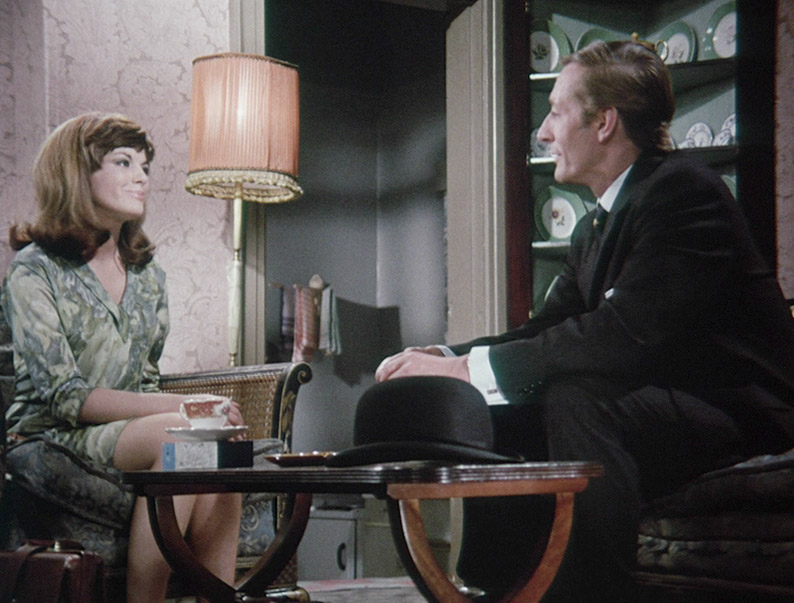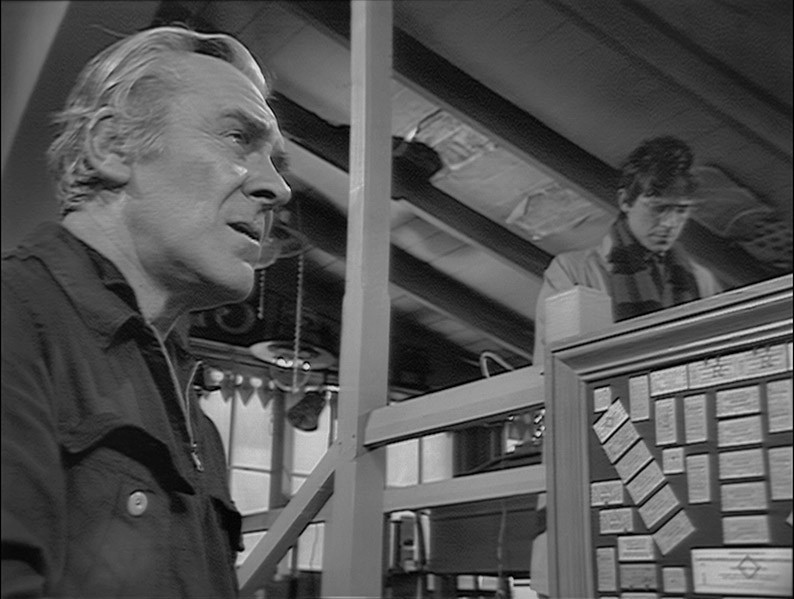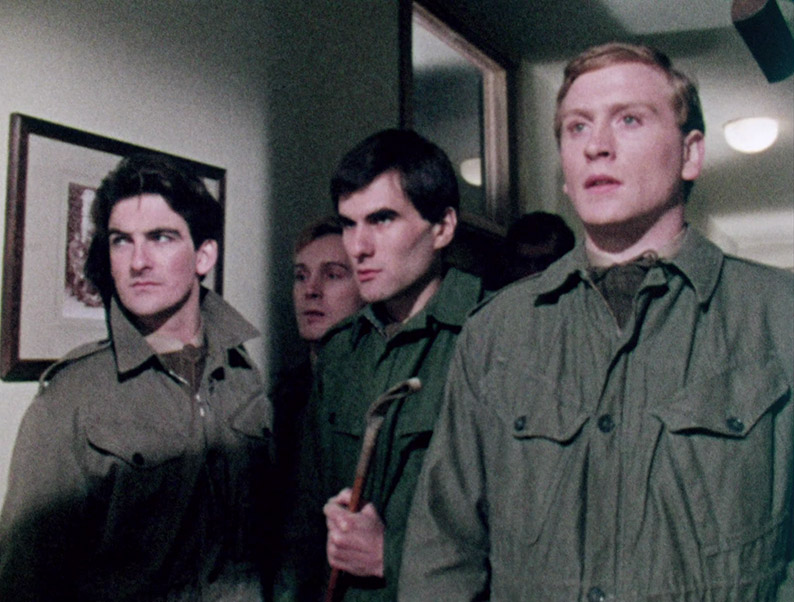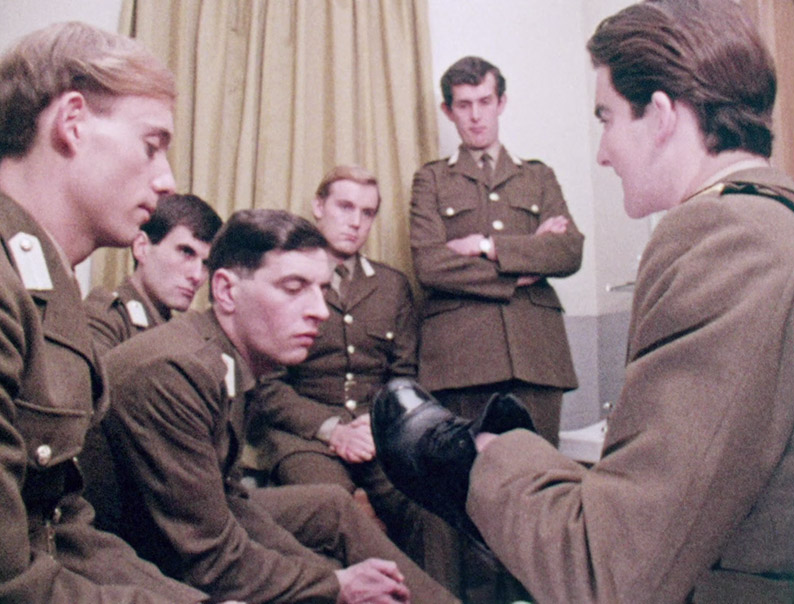|
| "I think for a number of years Alan Clarke was the best kept secret of British Film." |
Richard Kelly |
He's not wrong. Then again, while we have for decades celebrated feature film directors, those in television have tended to fly under the radar, unless they start making films for the cinema, of course. That's certainly how I discovered the work of Alan Clarke, as a teenager at film school, sat in the front row of a bloody big cinema as Scum hit me square in the face with a sock stuffed with snooker balls. Only later, as I was repeatedly blown away by a series of extraordinary made-for-television works, did I connect the dots and realise that the guy who had made Scum had also been responsible for Made in Britain, The Firm, Christine and Elephant. And back in pre-digital days it was a job and a half to track down the back catalogue of even the most celebrated feature director, let alone one who'd worked almost exclusively in TV. Even today that would present a challenge, as great works of drama sit in television vaults or have been wiped or destroyed to make room for more trivial material.
Back in 2004, I championed Blue Underground's The Alan Clarke Collection as the DVD box set of the year, and with good reason. Not only did this release recognise and celebrate the talent of this extraordinary filmmaker, but it brought together some of his finest films and pampered them with some genuinely excellent extra features. The absurd thing was that this box set was put out by an American distributor, and thus had to be imported into the country in which Clarke lived and worked for most of his life (in this respect, Blue Underground's decision not to regionally encode the discs was one to be cheered). I concluded my overview of the set with this plea: "There's only one way Blue Underground could really follow this – a second Clarke box set containing Road, Christine, Penda's Fen, To Encourage the Others, Baal and Contact. No pressure, guys." Sadly, that wish-list box set never appeared. Then earlier this year the BFI announced that they were going to seriously outstrip this request by releasing Dissent & Disruption: Alan Clarke at the BBC (1969-1989), and not just on DVD but Blu-ray as well, with restorations of all of the works in the set and a small warehouse of extras, including some of those from the Blue Underground set.
Despite walking around with my jaw dragging along the floor behind me for several days and wanting more than anything to cover this set for the site, I quickly realised that it wasn't going to happen. We're a small operation whose writers all have full-time day jobs and other time-swallowing personal commitments, and despite our passion for Clarke's work, the sheer volume of material included in the set meant we'd be struggling to even watch it by the release date, let alone do it justice. I'm not completely sure how I ended up being talked into taking it on regardless. Temptation probably had a lot to do with it – offer any fan of the films of Alan Clarke the chance to see and write about such a collection and see how long they put up a show of resistance. And once I had my hands on the stand-alone release of The Firm, I knew there could be no turning back.
So how do we approach reviewing such an extraordinary box set? Certainly reviews of our usual length of each of the included titles was never on the cards, but a quickly dashed off, one-line summary for each would clearly be inadequate. In the end we settled for a compromise – we'd cover each of the titles and extra features individually as capsule reviews of between two and four paragraphs apiece, and would expand on that if we have the time and inclination to do so. Frankly, I'd love to expand on all of them at a later date, but there are other titles to cover and I've been living and breathing Clarke for a solid month now. And it's been just great.
This has to be our longest review yet and spans an unprecedented nine pages. We've decided to cover the set on a disc-by-disc basis, and have included an index below to enable you to hop straight to a particular disc or title. Where previous reviews exist for stand-alone releases of titles – specifically Penda's Fen, The Firm, Elephant and the BBC version of Scum – they have been reproduced here with any additional extra feature or technical information added or modified accordingly, which keeps this as a complete review rather than one peppered with links to other pages on the site. We've also briefly commented on the picture and sound of each of the films, but there's a lot of repetition here – those shot on 16mm tend to have similar virtues or restrictions, as do those shot on analogue video, and the soundtracks all appear to be Linear PCM 2.0 mono – but it's still worth highlighting the small variations. The audio-visual coverage on The Firm, Elephant and Penda's Fen is more detailed because the remarks have been copied over verbatim from the reviews stand-alone releases of those films.
Finally I'd like to add my heartfelt thanks to Camus, who despite having to put some serious hours in on the film he is currently editing, agreed to cover a considerable number of the titles here. Without him this review would have not appeared for a good few weeks after the release date, and as the reviews are split between us and come from personal viewpoints, I've identified the writer in each case. All of the extra features were covered by me unless otherwise stated.
DISC 1: George's Room / The Last Train Through Harecastle Tunnel / Sovereign's Company
DISC 2: The Hallelujah Handshake / To Encourage the Others
DISC 3: Under the Age / Horace
DISC 4: The Love-Girl and the Innocent / Penda's Fen
DISC 5: A Follower for Emily / Diane
DISC 6: Funny Farm / Scum
DISC 7: Bukovsky / Nina
DISC 8: Danton's Death / Beloved Enemy
DISC 9: Psy-Warriors / Baal
DISC 10: Stars of the Roller State Disco / Contact
DISC 11: Christine / Road
DISC 12: The Firm: Broadcast Version / The Firm: Director's Cut / Elephant
DISC 13: Half-Hour Stories – Shelter / The Gentleman Caller / Goodnight Albert / Stella / The Fifty-Seventh Saturday / Thief
DISC 1
| George's Room (1967) |
Slarek |
|
One of ten episodes directed by Clarke for the Rediffusion drama series Half Hour Story (six more of which are included in this collection on disc 13), George's Room is an involving two-hander starring John Neville as a well-to-do gentleman looking to rent a room from a friendly but slightly cagey widow played by Geraldine Moffat. Written by Alun Owen, whose credits include A Hard Day's Night, six plays for the prestigious Armchair Theatre and three more episodes of Half Hour Story (all of which were also directed by Clarke), it delights from the start in the small ticks of the language of conversation and even how inflection can change how we perceive even a seemingly noncommittal exclamation like "Ah."

What intrigues from the off is that from the moment she opens the front door, the Woman (the only character named is the titular and since departed George) seems uncertain about whether she really wants to rent the room after all, and reasons are teasingly slow in coming and ultimately troubling in their nature when they arrive. That some of the Man's gentle attempts to get to the truth are a tad trapped in time is perhaps inevitable – there's a hint that looks are believed to count for more than personality when it comes to enjoying life, at least for women – but the root cause off the Woman's discomfort still sadly has its equivalent today.
As a single location, shot-on-video, studio production – almost the whole play takes place in a small living room – Clarke's direction may seem to be less visible than in his later, single camera 'walking films', but his use of facial close-ups and unusual decision to shoot a substantial portion of the play looking slightly upwards at the characters rather than matching their eye-lines is subtly disconcerting in a manner that fits with the gradual unraveling of the Woman's back story. Technically, it is a touch ragged in places, with some twitchy camera framing (I'm presuming this wasn't intentional and not another example of Clarke predicting where things would later stylistically head) and the odd boom mic shadow crossing John Neville's face, but these are not major distractions. And as a half-hour play it delivers the goods, a smartly written (oh, to hear dialogue this good on television today) and very nicely performed work that makes very fine use of its compact running time.
| The Last Train Through Harecastle Tunnel (1969) |
Camus |
|
This is another little gem featuring a put upon clerk in an office who also has a grand passion for trains. His colleagues mercifully tease him and both have great plans for the weekend, golf with the boss and an intended seduction. All put-upon Benjamin Fowler (Richard Callaghan) has in store is travelling on the last train through a tunnel due for demolition. On his trip, he encounters burly and pissed off soldiers with his passion for trains an impenetrable shield protecting him. His erudition on the subject impresses a middle-aged couple. He wows the woman enough to admit that she's never really loved her husband as the impressed man himself ferries his sister back to her carriage. Such human encounters make us ask if the misfit is the misfit or is he a character who fits so well, we have to demonise him for not wanting what the rest of us want (sex and golf apparently).

TV studio-bound for the most part and under the banner of 'The Wednesday Play', this is a keen examination of nerdism before the word was officially coined. Once at his bedsit, Benjamin meets a former railway guard whose memorabilia delights him and is saddled with the guard's son Jackie for the evening. To say Griffith Davis' ©-70s-homosexual doesn't grate would not be the whole truth. Comedians of the era (Dick Emery et al) would portray any LGBT character off the camp chart by some miles although according to the media it seems the L, B and Ts didn't exist in 1969. To be called 'a poof' was a damning insult and if viewing these films so far out of context tells us anything, it's how far we've come socially. Not enough, you understand but a way of sorts.
On the train Benjamin comes into contact with a hero of his, Judge Grayson (an effortlessly suave John Le Mesurier). Meeting at his house, the star-struck lad is able to indulge his passion in a practical way pulling replicas of points levers as the Judge lives out his own fantasy world. What Benjamin sees out the window sets up a disturbing penultimate scene that is left to your imagination but doesn't bode well for the characters involved. It's odd to me that two films in on Clarke's early work and pedophilia is not too far from the dramatic stories being told even if it's on the periphery. Operation Yewtree has a lot of us asking if we went around with our eyes closed in the 70s and 80s.
| Sovereign's Company (1970) |
Slarek |
|
As the academic year at an army officer training academy gets under way, a group of new recruits in Blenheim Company – who currently hold the honour of being the Sovereign's Company of the title – are put through their paces. Among them is the hesitant Andrew Cantfield, who appears to have signed up not through any military ambitions of his own, but to live up to the expectations of his grandfather, a celebrated and bumptious Major-General.
Written by Don Shaw, whose later work for TV included The Citadel, The Falklands Factor and three episodes of Danger UXB, Sovereign's Company deftly sidesteps temptations to crudely satirise the officer class or hammer home their distance from the common soldiery. This is instead wordlessly captured in a single sequence when the uniformed members of Blenheim Company, accompanied by the ceremonial pomp of marching band music, throw passing glances at an assault course as they make their way to the manor house in which they will receive more genial instruction. For Shaw and director Clarke, the primary focus is the recruits themselves and their developing friendships and rivalries with each other. To that end there's an interesting variation in their backgrounds, from ex-public schoolboys Dexter and Dankworth-Lowe to Londoners Sender and Hurt and goofy industrialist's son Alan Dawkins, whose over-eagerness to bond with his fellow recruits repeatedly falls on disinterested ears. That said, there were a number of occasions when officer training as depicted here felt like an extension of public school life as painted by Lindsay Anderson in If…., albeit without that film's call to revolution.

As with any film worth its salt featuring military recruits, there's considerable mileage in showing us outsiders some of the specifics of their training, something Shaw and Clarke do well by without ever making it the central focus – a film that can comfortably build two engrossing scenes around the polishing of boots is surely doing something right. But what really intrigues is how much we can deduce about the personalities and backgrounds of characters about whom very little is openly stated. This is particularly true of Cantfield, whose constant air of smiling apprehension and apparent fear of actual conflict tell a tale and a half about his long-standing history with his blustering grandfather. Every bit as suggestive is the falling-out that occurs between former school friends Sender and Hurt, seemingly triggered when Hurt is punished for Sender's transgression, while hindsight suggests that the whole thing may have been deliberately set up by Sender from an early stage.
Freed from the studio and shooting on 16mm film, Clarke really makes his mark here as a director, evident early on in his canny camera placement and the timing of edits (let's also give a shout to cameraman Peter Hall and editor Brian Keene here), but most especially in the corridor punch-up between the Blenheim boys and a party of invaders from Dettingen Company, where far from just observing, the camera is in on the action as if taking part in the battle, creating a sequence of claustrophobic energy that was to prove typical of Clarke's approach to violent confrontation.
Thoughtful, well cast and convincingly performed (notables include familiar faces James Cosmo as Senior Under Officer Patterson and Clive Francis as Dexter, but in what quickly became a signature of Clarke there's not a wrong note anywhere here), it's a thoroughly involving, refreshingly understated and character-driven work of the sort that seems to have sadly vanished from British TV screens.
George's Room was shot on analogue video in colour (the first, apparently faster edited monochrome version was wiped by Rediffusion just days after it was recorded) and is in very good shape, displaying a reasonable level of detail for non-HD material, a pleasant, pastel-leaning colour palette and no trace of damage. The soundtrack is clear with a slight treble bias (sommon in studio shot works of this vintage) and no obvious issues.
The Last Train Through Harecastle Tunnel was shot on monochrome analogue video and has scrubbed up surprisingly well, with a nicely balanced greyscale, solid black levels and a crisp level of detail. Again there is no trace of damage here. The soundtrack is once again clean and the dialogue very clear, with no background issues or traces of damage.

Sovereign's Company was shot on 16mm film, and while not as crisp as later film-shot works such like Christine and The Firm, it still displays a decent level of detail. The film grain is very visible in places, suggesting the use of a high speed stock, and there is a slightly earthy bias to the colour scheme that is common in the earlier film-shot works in this set, but here seems to compliment the military green of the cadet uniforms. There is some loss of detail in the darker areas of some scenes, but this is likely down to the lighting and shooting conditions. The picture is consistently clean and displays not a whiff of damage. A clear sound mix serves the dialogue well and there's no background hiss or crackle.
Alan Clarke at the Questor's Theatre
Really valuable stuff this, a 33-page, manually advanced image gallery containing surviving programmes and stills from a number of Clarke's early stage productions, which included works by Marlowe, Shakespeare, Euripides and O'Neill.
Alan Clarke: Out of His Own Light (Part 1) (30:59)
The first part of this epic new episodic documentary on Clarke inevitably focuses on his early life, his work with Questor's Theatre, his first steps into the television industry and his first work as a director of TV plays. There's some fascinating stuff here and some really worthwhile interviews (a couple of which are archive and framed 4:3): several discuss what made Clarke's stage productions so unique; producer Stella Richman recalls being blown away by Clarke's stage production of Macbeth and supporting his ambition to become a TV director; lead player Geraldine Moffatt provides some interesting recollections of making Stella and George's Room; and actors Angela Pleasance and Richard O'Callaghan talk in detail about filming The Last Train Through Harecastle Tunnel. Surprisingly, Sovereign's Company only gets brief coverage, with director Paul Greengrass remembering it as the first Alan Clarke film he saw. There's plenty of genuine praise for Clarke and his work, particularly from Angela Pleasance, who describes him as "perfect" and a man who set a standard that she has compared all other directors to. There's also (surprisingly) a censored word at one point here, the only one in the whole set – good luck with the lip reading.
|